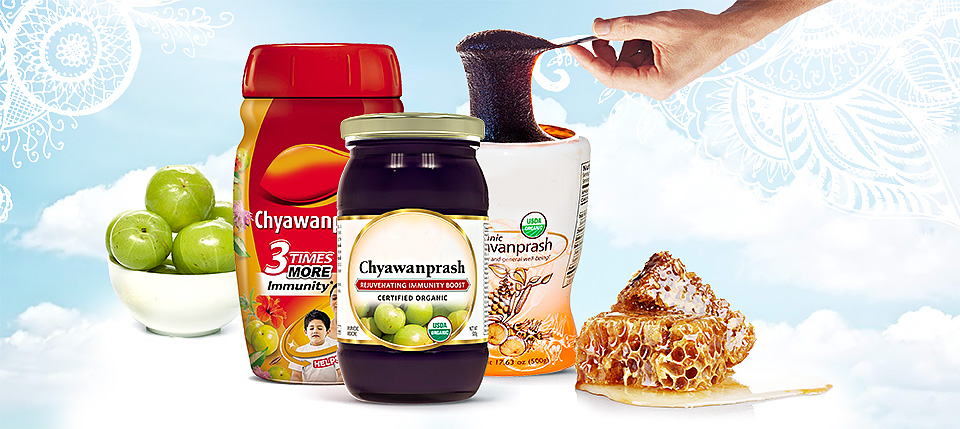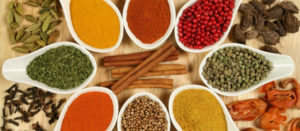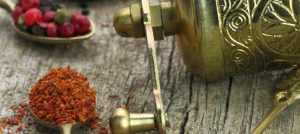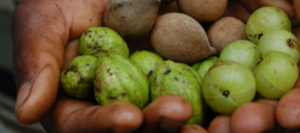Chyawanprash is a delicious nutritive jam that has been used in Ayurveda for thousands of years, offering a wide range of health benefits. It is an anti-aging supplement, which is purely herbal in nature. It stands at the forefront of rejuvenation supplements and therapies. In Sanskrit, the word, “prash” refers to a specially prepared food.
Chyawanprash is made with a base of amalaki fruits (Emblica officinalis) and typically contains a number of other herbs, ghee, sesame oil, sugar, and/or honey. The honey, ghee, and sesame oil serve as yogavahis (catalytic agents) to carry the herbs deep into the tissues, while the sugar is considered a samvahaka dravya (preservative substance) which helps to safeguard the clinical efficacy of the main ingredient, in this case amalaki.
While the first known source of the “recipe” for chyawanprash is found in the Charaka Samhita, an ancient Ayurvedic text, the jam is also described in several other respected Ayurvedic texts, often with some alteration to the “original” formula.
Legend of Chyawana
It is named for the sage Chyawan (= Cyavana) who had become very old, but then once more became youthful through taking this preparation. Chyawan had become engaged, through chance meeting and customs of the time, to a young wife, the princess Sukanya. He realized that his aged and weakened body would be a burden to her and sought the help of celestial physicians. They prepared this medicine thus the sage regaining his youth and longevity.
The properties of Chyawanprash are also reminiscent of those attributed to the premier tonic herb of Chinese medicine: ginseng.
Ingredients
This potent herbal tonic which is known as a fruit jam containing honey has a mixture of 49 Ayurvedic herbs. Amalaki or Indian gooseberry is the main ingredient of this tonic. About 100 g of this product contains 15,000 mg of amalaki. It also contains other powerful herbs like Bilwa (Aegle marmelos), Agnimantha (Premna corymbosa), Bala (sida cordifolia), Mashaparni (Teramnus labialis), Mudgaparni (Vina trilobata), Prishnaparni (Uraria picta), Shalaparni (Desmodium gangeticum), Pippali (Long pepper), Gokshura (Tribulus terrestris) etc which are known for their health benefits. Most of these herbs are found in Himalaya and other parts of India. The herb extracts are combined in pasteurized safflower honey and clarified butter. Some companies do not add sesame oil, but in the classical text Charaka Samita, sesame oil is a main ingredient of chyavanprash. Most of the herbs in the formula are boiled in water, and then the dried extract is combined with honey; a few aromatic herb powders are then added to the extract: cardamon, cinnamon, and clove. The finished product is syrup that is not unlike molasses, but with a bright sour and spicy taste. Some versions have a “crunchy” quality from unprocessed herb ingredients.
Nutrition Facts & Information
10 grams of Chyavanaprasam contains:
Serving Size: 10 grams Quantity % Daily Value
Calories 35
Calories from Fats 7
Total Fats 750 mg 1 %
Saturated Fat 300 mg 1.5%
Trans Fat O mg
Cholesterol 0 mg 0%
Sodium 5 mg 0.25%
Total Carbohydrate 7.5 grams 2.5%
Dietary Fiber 500 mg 2%
Total Sugars 3.5 to 5.5 grams
Protein 150 mg
Vitamin C 2.1 to 3.4 mg 2.32 to 3.75%
Percentage Daily Value is based on a 2000 calories diet.
Phytochemicals Compositions
10 grams of Chyawanprash contains:
Total Flavonoids 20 mg
Total Alkaloids 80 mg
Total Saponins 5.24 grams
Antioxidants 280 mg
Piperine 4.2 mg
Phenolic Compound 535 mg
These facts are analysed for chyawanprash containing 36% sugar content.

Therapeutic indications
Chyavanprash helps in many diseases by improving body defense mechanism to fight against external stimuli and factors that cause a disease in the body. The detailed indications are given in the following list:
- General Debility
- Chronic cough
- Heart diseases
- Anemia
- Asthma
- Recurrent colds
- Blood disorders
- Dry skin
- Headache
- Anorexia nervosa
- Gout or elevated uric acid
- Generalized swelling (especially due to unknown etiology)
- Weak eyesight
- Lung injury
- Tuberculosis (TB)
- Male infertility
- General debility
- Nutritional deficiency disorders
- Memory loss
- Attention deficit hyperactivity disorder (ADHD)
- Insomnia (Sleeplessness)
- Debility after any disease
- Dementia
- Alzheimer’s disease
Benefits
- According to theCharaka Samhita, Chyavanprash is “the foremost of all rasayanas”.
- Pacifies Vata, Pitta and Kapha
- Rich supply of anti-oxidants and Vit C delays ageing of cells and increases complexion by sufficient oxygenation and protection of skin and deep tissues.
- Bolsters the immune system by increasing ojas.
- Increase production of haemoglobin and WBC.
- Increase strength and mass of tissues.
- Safe and beneficial for pregnant ladies (provide overall health to foetus and mother, ensures regular and natural supply of Vit C and enhances iron absorption, thus reducing risk of anemia)
- Eliminates toxins from the blood, liver and spleen.
- Nourishes and protects respiratory passages and lungs, protecting from cold and asthma.
- Kindles the digestive fire sufficiently.
- Supports proper metabolism and regular elimination of faeces.
- Keeps the heart healthy, reducing the blood glucose and cholesterol levels.
- Increases fertility, libido and sexual strength for both sex.
- Normalize blood pressure.
- Induce calming sensation on nerves while improving concentration and memory.
- Contains saponins which reduce colon cancer risk.
How to use
Chyawanprash is a safe herbal tonic and people of all ages can take it for promoting health, wellbeing and longevity.
Chyawanprash can be taken alone, it can be stirred into milk or water, or it can be spread on toast, bread, or crackers—like any other jam. It is ideally taken alone but in case of burning sensation in the stomach afterwards, one can take it with warm milk. For some people, abdominal flatulence and distention is seen if it is taken with milk.
As a rejuvenative, chyawanprash is typically taken in the morning in empty stomach, or sometimes in both the morning and the evening. For increasing body weight, it is taken after meals.
Chyawanprash can be taken on a long-term basis as part of a program designed to support overall strength and immunity, even supporting the natural systems of the body after a bout of stress or illness. For others, it is more appropriately used seasonally, as a tonic in the winter months.

Dosage
The dosage and amount of chyawanprash depends on the digestive power of the person. There is no dosage restriction according to Charak, but one should not eat beyond his digestive fire (detected by loose stools). Nowadays, people have decreased digestive power and they are living a sedentary lifestyle, so dosage should not exceed from 20 grams a day (1 or 2 tbsp).
Chyawanprash can be given to a child from 5 year old onwards. To be on the safer side, the dosage for children should be quarter to half spoon with a glass of milk.
- Age group 0 to 1 year: 1 gram ( to be eaten by the lactating mother)
- Age group 1 to 5 years: 2.5 grams (a half teaspoon)
- Age group 6 to 12 years: 5 grams (one teaspoon)
- Age group above 12 years: 5 to 20 grams (1 teaspoon to 4 teaspoons).
In pregnant women: One teaspoon (5 grams) in the morning and one teaspoon in the evening.
Contra-indications
In the following conditions Chyavanprash is to be avoided:
- All types of Diabetes
- Gas and flatulence
- Abdominal distention
- Frequent urination at night
- Night falls
- During constipation ( if it occurs due to intestinal obstruction and abdominal gas) and diarrhea
- Known allergies to any of the ingredients of the preparation.
- For pitta-types or those with pitta imbalances, chyavanprash may be increase heat during hot weather.
- Use caution in patients with hypoglycemia and in those taking anticoagulant or antiplatelet medications. If you are taking prescription medication of any kind, it is always best to check with your doctor before introducing an herbal regimen.
Side effects
Chyavanprash is overall a safe herbal tonic. There are no or minimal side effects reported with its use.
- Weight gain unlikely due to ghee. The ghee, or clarified butter, isn’t the main ingredient and very little actually goes into it to ensure a proper mixing of the ingredients.
- Burning sensations.Some people complain about a burning sensation in their stomach after consuming this herbal tonic, likely due to the strong herbs that go into the mix. Drinking some warm milk after taking chyavanprash will help soothe that. To avoid this, you can also start with half a teaspoon of the mix instead, take milk, and then over time, increase the amount to one teaspoon once your system gets used to it.
Dr. Anjaly Vishnu (BAMS)
Private consultant at Kollam, Kerala





